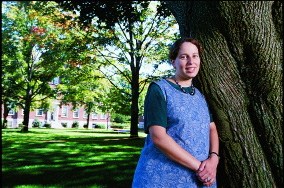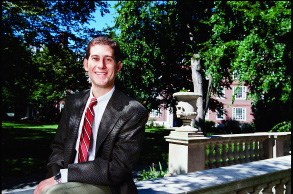 |
| Forum fellow Meira Levinson combines hands-on teaching experience with her scholarship. |
| Photograph by Stu Rosner |
The "Young Faculty Leaders Forum" aims to inspire and energize the people who will influence debate and research within the academic community, and lead reform of education systems in the years ahead. The forum, as Light has conceived it, involves unusual forms and strategies.
First, the participants, who hail from leading universities across the country, were deliberately selected from diverse disciplines and backgrounds. Light identified more than 100 candidates by asking pillars of the academyDuke's president, MIT's chancellor, Yale's dean, Princeton's provostto nominate the most promising young scholars they knew, and then rigorously interviewing all of them himself. (Those senior academic leaders, and others, have joined the forum's advisory board.)
Second, participants are being brought together in ways intended to foster fresh collaborations across disciplinary and institutional boundaries.
And finally, Light is taking pains to introduce the young scholars to people in business and government who care about the same education issuesexposing them to perspectives that, say, a
junior professor in the humanities might never encounter otherwise. According-ly, the forum is housed at the Kennedy School's Center for Business and Government (CBG); drawing perspectives from Light's dual perches at the Graduate School of Education and the Kennedy School, its advisory board includes private-sector, government, and academic leaders and scholars. Light's soulmate in organizing the project is Thomas J. Healey, M.B.A. '66, a Goldman Sachs alumnus and adjunct lecturer at the Kennedy School, who serves as forum vice chair.
In the last weekend in September, 34 fellows from around the country arrived in Cambridge for the first of a series of retreats scheduled to take place during the next three years. In their first two days together, they heard from Harvard president Lawrence H. Summers; from Roger Porter, IBM professor of business and government and master of Dunster House, who knows equally well what makes economic policy and contemporary undergraduates tick; from Karen Arenson, M.P.P. '72, the New York Times education reporter; and from Steven Wilson, a CBG fellow who has been an entrepreneur, state government official, and CEO of Advantage Schools, which managed urban and charter schools. Light hopes that kind of programming will sustain and broaden the fellows' view of education, even as their scholarly obligations push them to focus on narrow research subjects.
More important than the guest speakers' insights, however, will be what the fellows hear from one another. At each retreat weekend, several of the fellows will make presentations on their work, inviting critiques and involvement from their peersand, Light imagines, unexpected collaborations on how to improve some facet of education in America.
The possibilities are intriguing. Forum fellows have worked on access to and familiarity with technology in the educational context; written about the effects of financial aid on students' college choice; or toiled in the U.S. Department of Education. One fellow, Jeff Dolven, Jf '00, now on the English faculty at Princeton, migrated there by way of undergraduate work in philosophy at Yale, a Rhodes scholarship, and a Yale doctorate in English. While at Oxford, he coordinated a peer tutoring program for at-risk teenagers at a local school. Then, during his subsequent posting as a junior fellow at Harvard's Society of Fellows, he took a leave of absence to teach writing at two Boston high schools and to work with other teachers to improve student writing. His research, culminating in a book on Renaissance romance and humanist pedagogy, draws lessons for contemporary teaching and curriculum design from debates in England and Europe in the 1790s about the role of literature.
 |
| Brian A. Jacob, an assistant professor at the Kennedy School of Government, another participant in the forum, has worked in the Chicago public-school system and now investigates the effects of testing, summer school, and gender gaps on students' graduation rates and learning performance. |
| Photograph by Stu Rosner |
Forum fellow Meira Levinson (one of only three who are not now full-time faculty members) also combines hands-on teaching experience with a scholar's view of schooling. After graduating from Yale, Levinson completed a Ph.D. in political philosophy at Oxford on a Henry Fellowship. Rather than taking a university position, however, she began teaching in public middle schools in Atlanta. Her first book, The Demands of Liberal Education, published by Oxford University Press, addresses questions of political philosophy and changes in American education. Recently relocated to Boston, she has been teaching full time in a public middle school, but is now the dual beneficiary of a Radcliffe Institute fellowship and a Spencer Foundation postdoctoral award that enable her to work on her next book.
A third participant, Jacob S. Hacker '94, Jf '02, extends his involvement with Harvard and brings a policy perspective to the forum. His undergraduate thesis, on the Clinton administration's abortive healthcare reform, became The Road to Nowhere, published by Princeton University Press. Now, with a Yale doctorate, a Harvard junior fellowship, and a recent Yale faculty appointment in political science in hand, Hacker has completed another book, The Divided Welfare State, on public and private social benefits in the United States.
What does Light expect to get from mixing such eclectic scholar-educators together while their careers are just taking shape? Like Cecil Rhodes, he is betting that giving very smart and accomplished people a chance to extend themselves will pay off in nurturing future leaders. The 34 forum fellows combine scholarly muscle with what Light calls "a strong interest in and demonstrated commitment to educational reform"indeed, half the fellows have primary- or secondary-school classroom experience, like Levinson and Dolven. (Seven fellows teach at schools of education, building links to that important community.) Light wants to build a "community of scholars" who can turn thinking upside down at all levels of education. He can envision fellows collaborating, say, on a project to think through the "digital divide," applying the perspectives of an historian, a sociologist with policy experience, someone from a school of education, and an English professor.
For the fellows, the forum is a labor of love. Light has organized it without offering stipends; the Hewlett Foundation and six private individuals interested in education reform, organized by Healey, have contributed funds for travel and lodging expenses. The immediate reward for participating is the opportunity to share ideas with other bright young scholars who have an itch to make American education better, and to meet with people in other sectors who also work on schooling.
The fellows' interactions, Light expects, will not only overcome the isolation that can be the scholar's lot, but also pollinate ideas from which American education as a whole will benefit in the years to come.





